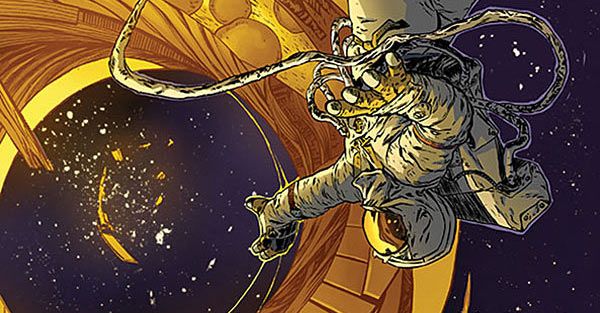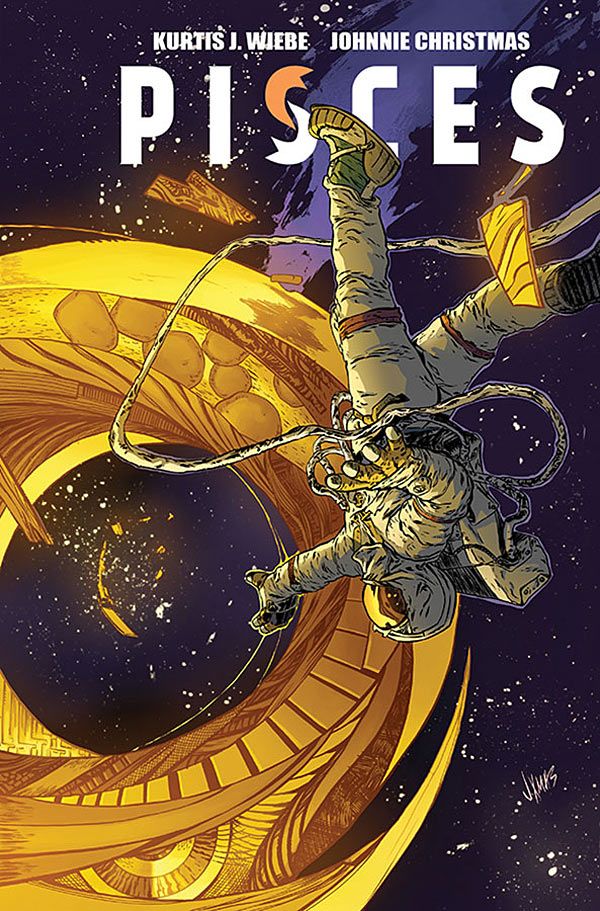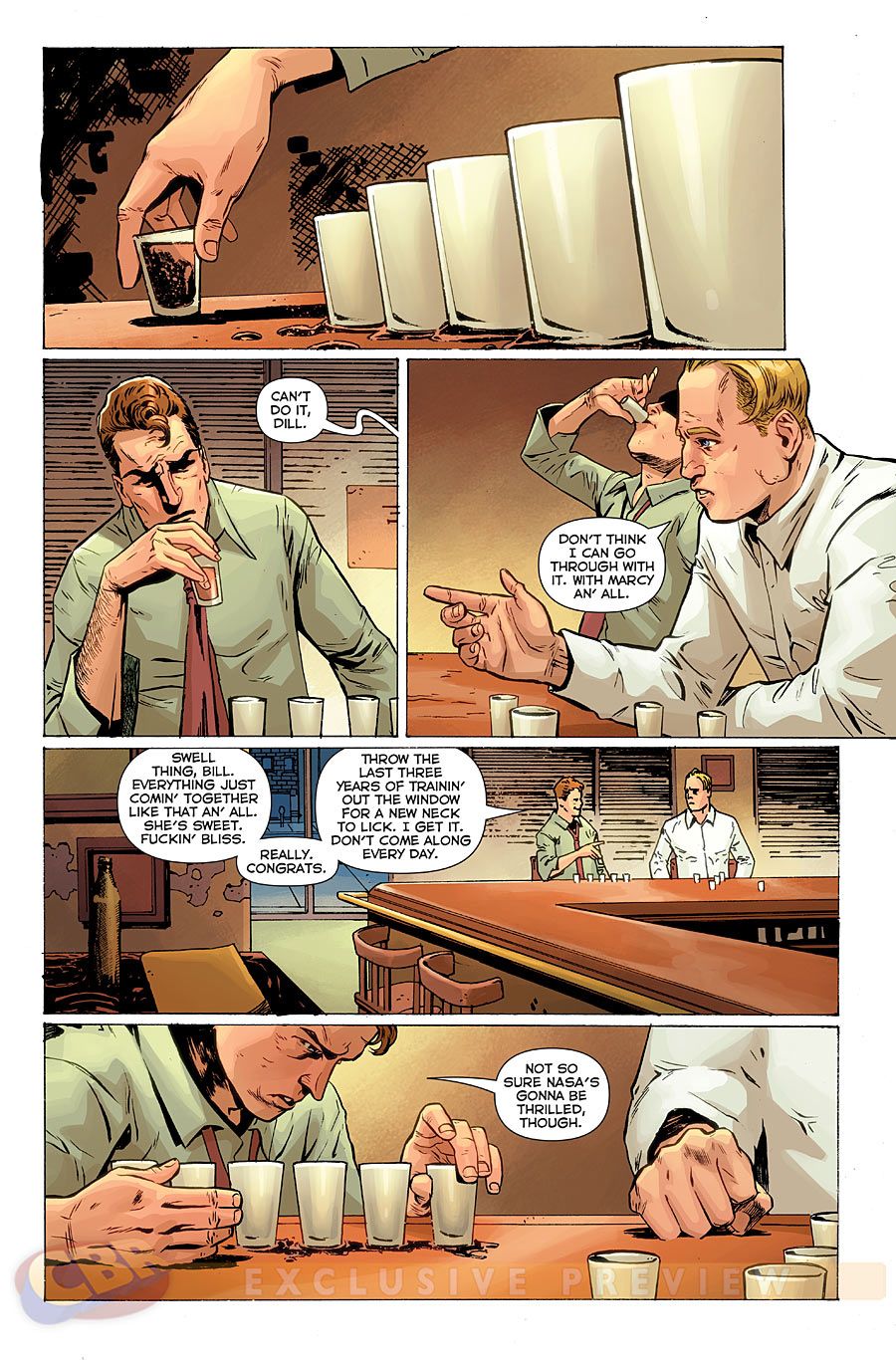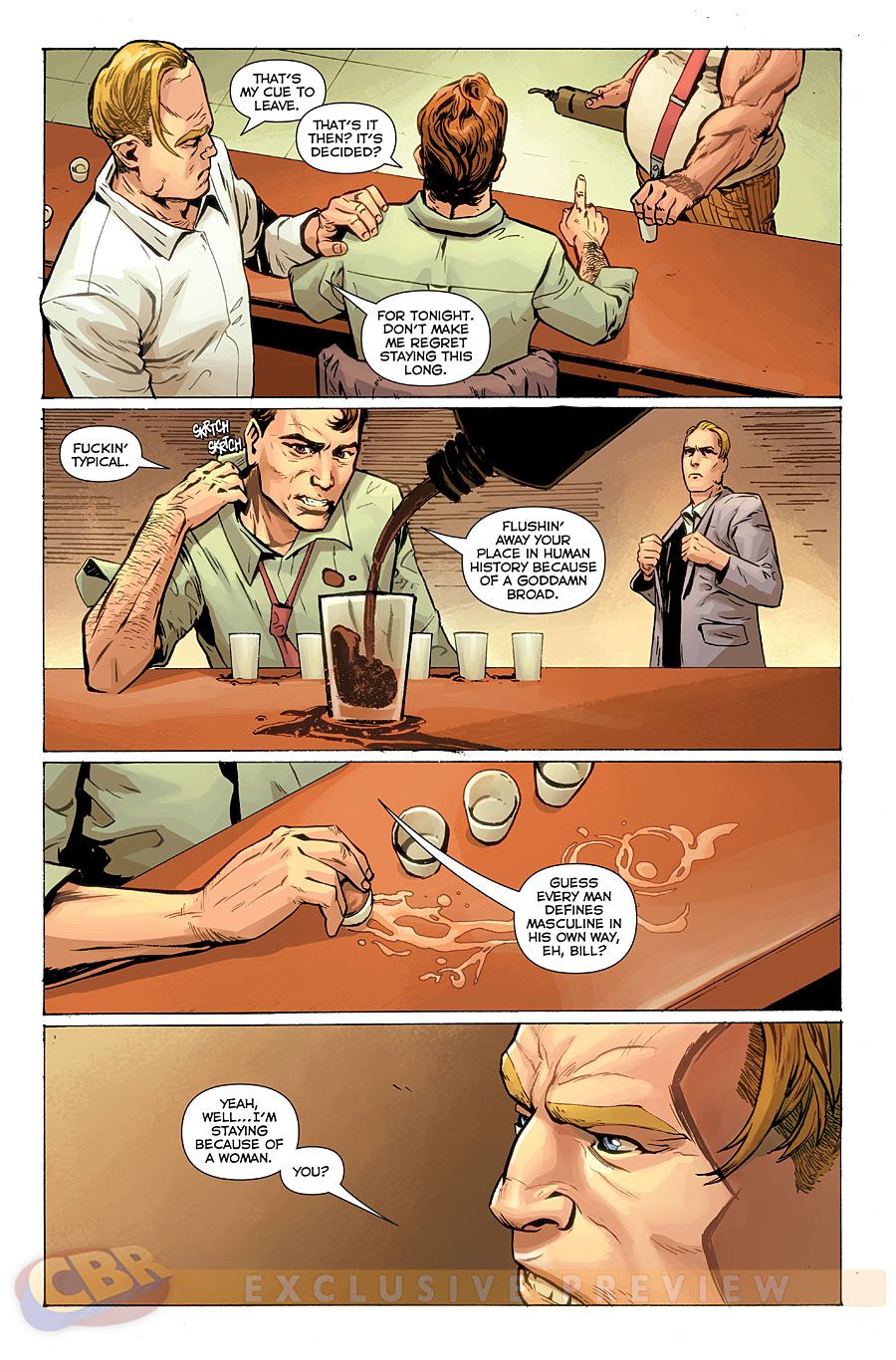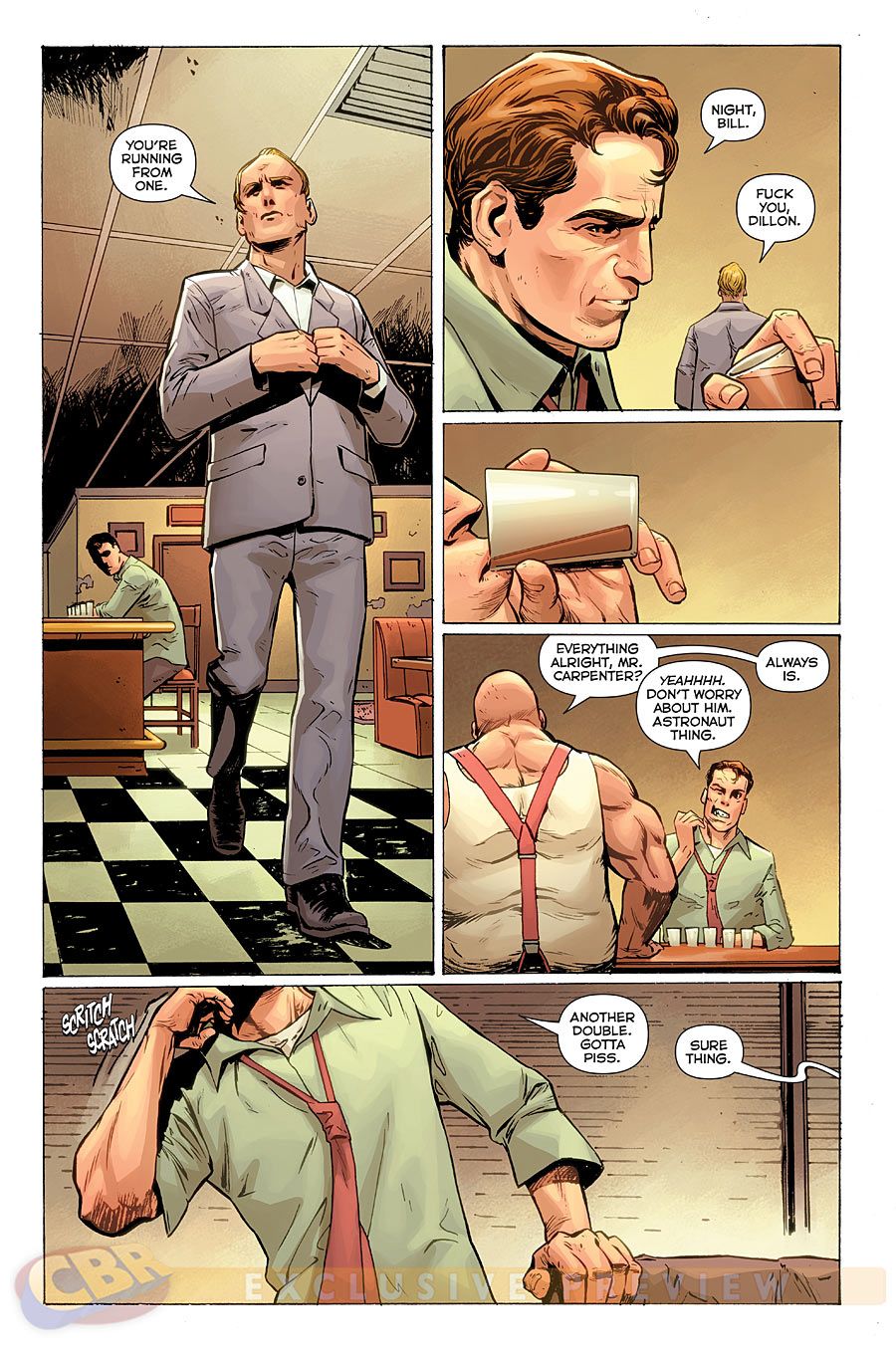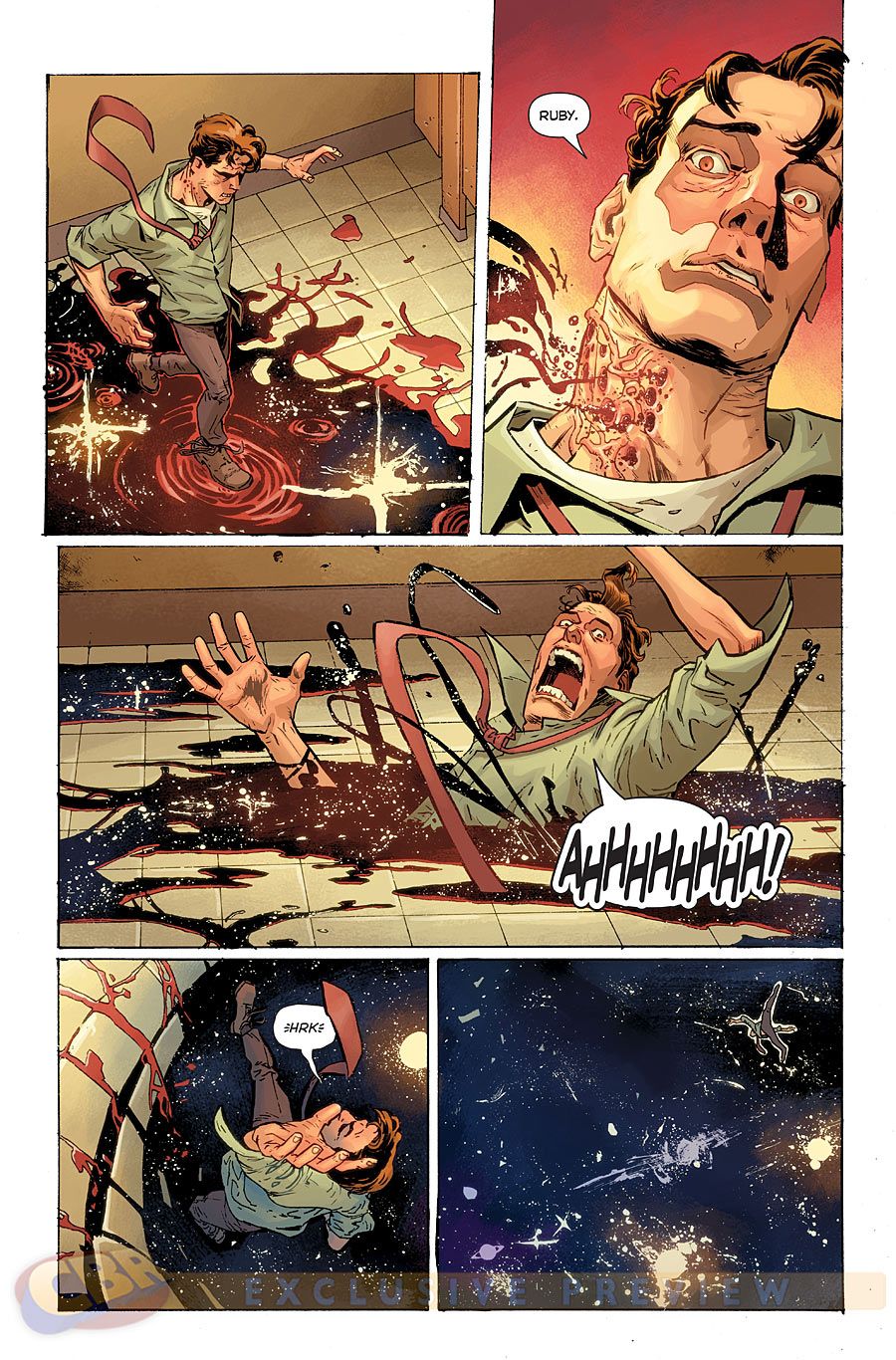Beginning this April, writer Kurtis J. Wiebe and artist Johnnie Christmas unleash "Pisces," their all-new Image Comics series. Following former fighter pilot Dillon Carpenter as he recovers from his stint in the Vietnam War, this story travels to the cosmos and back as Carpenter becomes part of a top secret NASA mission to make first contact. Combining elements of David Cronenberg-esque horror and psychological tension, "Pisces" marks Wiebe's return to the horror genre and his first collaboration with "Sheltered" artist Christmas.
Braga Triumphant: Kurtis Wiebe Talks "Rat Queens" One-Shot
Both Wiebe and Christmas spoke with CBR News on the project and provided us with five exclusive and brutal pages of Christmas' handiwork. Keep reading for more on the initial inspirations for the series, the team's approach to horror and how Wiebe plans to exorcise some personal demons on the page.
CBR News: Kurtis, tell me more about "Pisces"-- so far we know that it's a post-Vietnam War story touching on space travel?
Kurtis J. Wiebe: We'll be telling the story of Dillon Carpenter, a former fighter pilot in the Vietnam War. Pisces will take place over a number of years in his life, beginning with a traumatic event during the war and continuing to follow him as he returns home and finds himself a prime candidate for a secret space mission with NASA.
It's when he returns home that his life starts to unravel. Dillon suffers from hallucinations, always tied to the deep void of space.
What interested you about this time period and subject matter?
Wiebe: It'd started with personal reading on Voyager 1 and Voyager 2. I enjoy reading about space exploration; it's a fascination with me in a weird way because I find it as terrifying as I do interesting. There's something about the infinite depths of the universe that unsettles me in a way I can't explain.
I'd read an article about the Voyager mission, how the probe still sent data back to Earth 30 years later and I was kind of blown away.
I met up with Johnnie Christmas and Brandon Graham for coffee after I'd been reading about the Golden Record aspect of the Voyager program and talked jokingly about the idea that eventually became "Pisces."
I'd said it more as a passing thought, but Johnnie called me up a few days later and said he couldn't stop thinking about the idea and wanted to pursue it. When Johnnie said he wanted to do something with the idea, we just rolled with it. We've been working on the concept on and off since winter 2013, always refining the core story and making sure Dillon's journey is grounded, no matter how bizarre the series may get.
We have created this together from the ground up; it's equal parts of both of us.
Johnnie Christmas: I'm interested in the grand gesture of space exploration being undertaken in a time of cautious optimism. The idealism of the '60s was long gone and the scars from the Vietnam War were fresh. But in the midst of all that, the Voyager program embarks on a new age of discovery, pursuing the exciting possibility of first contact.
Wiebe & Rossmo Welcome You to "Green Wake"
You've been away from the horror genre for a little while--what brought you back?
Wiebe: When I wrote "Green Wake," I'd been through the end of a very difficult marriage and that series had been a savior to me in a lot of ways. I channeled a lot of my experiences and pain through it, a sort of coping mechanism, I suppose.
With "Pisces," I've gone through a lot of change in the years Johnnie and I have been developing it. Lots of positive change, but the experiences are something I look back on and, in a lot of ways, can't believe about myself. When you take an honest look and see yourself for who you are, or were, there's a lot of fear you have to face.
That's what "Pisces" is: me facing my demons.
In your mind, what makes for a good horror story? What makes "Pisces" scary?
Wiebe: Helplessness and isolation. Unable to do anything about your fate, or, even worse, suffering a horrible one because of the choices you made. Pisces is primarily a psychological horror series, juggling the concepts of isolation, loneliness and vulnerability.
It is also influenced by early Cronenberg body horror. I recently discovered some of his '70s films and they really unsettled me. When I write horror, I want to create scenes that make me uneasy, both in a physical and emotional sense.
"Pisces" does both of those in spades.
Christmas: A good horror story has to hit home in one way or another. Nothing is more frightening than when the intimate and comforting becomes alien and unfamiliar. Like waking up to find your puppy staring at you with reptilian eyes.
Tell me more about the main character of Dillon. Where is he at when you introduce him?
Christmas: He's a man on a mission, he just doesn't know it yet. He's kind of fumbling around in the dark when we first meet him.
Wiebe: Deep in the sweaty jungles of Vietnam. He's been shot out of the sky on a recon mission and is desperately trying to escape from behind enemy lines while being chased by the NVA. It's this experience in the war that fundamentally changes Dillon, the actions he has to take in order to survive will haunt him for the rest of the series.
This isn't a war story, however. It's about Dillon trying to recover from his trauma while adjusting to a life back in the U.S.
As I said earlier, we are meeting Dillon through different eras of his life, but it's the visions and hallucinations that are the connecting tissue between all of them. There is a space travel element at play, but how that manifests is part of the mystery in Pisces.
RELATED: Brisson Goes Off the Grid in Image Comics' "Sheltered"
One of the elements that sounded terrifying to me is imagining the dissociation people feel when returning from something horribly traumatic, like war. Did you do any sort of research on vets or PTSD?
Wiebe: I had done related research for "Peter Panzerfaust" as a basis for the character arcs in the series. I never really dive into the idea of PTSD in that series, however, it was more of an informative guide. Pisces will be different. It is very central to Dillon's arc, how he adjusts to life at home, how he trains for a secret mission to space, it's tied into everything he does and every choice he makes.
It is a terrifying concept, especially given that PTSD hadn't even been coined until a few years after the Vietnam War ended. There were other names for it, shell shock being one, but it wasn't given a lot of merit as a true psychological condition. Soldiers had to simply 'man up' and get over it, so Dillon is dealing with this on his own.
How are you guys developing the look?
Wiebe: Johnnie can probably answer this better than I, but I know films like "2001: A Space Odyssey" and "Alien" are going to be inspirational. That '70s vibe will be super important as well; Dillon has some influence from Steve McQueen.
Christmas: I'm exploring familiar vs. alien. I want the book to at times look and feel soothing, like a romance comic that's about to go off the rails. Kubrick does this well in "The Shining," the shots are beautiful, the lighting warm and the hotel is aesthetically pleasing. The horror is that it's all a lie, the horror is that it's all going to come undone and you'll have to bear witness to that undoing.
What is this series allowing you to explore personally?
Wiebe: Part of Dillon's story is a massive choice he makes in regards to his secret mission. It's a dangerous one, but an important achievement for mankind. It's a choice that I had to look to my own life to answer; what would cause a man to leave his world behind?
It's also a chance for me to face my weaknesses, the aspects of my personality that I am ashamed of, and lay them bare. Nothing scares me more.
Christmas: Home, redemption, forgiveness.
"Pisces" #1 is scheduled to arrive April 29 from Image Comics.

